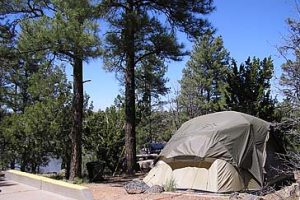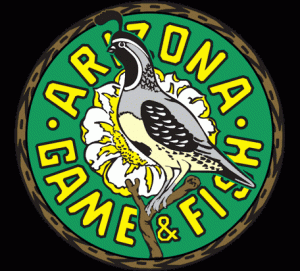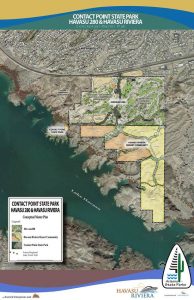Source: KJZZ 91.5.com – September 28, 2016
Arizona’s rebounding state parks system plans to more than quadruple the number of rental cabins at parks statewide, one of several major projects on the drawing board to improve and expand parks facilities less than a decade after the system struggled to keep parks open during the Great Recession. A legislative oversight committee’s recent endorsement of the plan set the stage for Arizona State Parks to solicit proposals from private vendors for 100 additional cabins at six parks.
The plan would have the park system pay a fraction of the cabins’ up-front costs, with most of the costs paid by a vendor who would provide the cabins. The state and the vendor then would share the rental revenue.
Parks where new cabins would be located are Cattail Cove at Lake Havasu, Lost  Dutchman in Apache Junction, Dead Horse Ranch in Cottonwood, Roper Lake near Safford, Alamo Lake north of Wenden and Buckskin Mountain near Parker. There are now 28 cabins at four parks: Roper Lake, Alamo Lake, Dead Horse Ranch and Lyman Lake near Springerville.
Dutchman in Apache Junction, Dead Horse Ranch in Cottonwood, Roper Lake near Safford, Alamo Lake north of Wenden and Buckskin Mountain near Parker. There are now 28 cabins at four parks: Roper Lake, Alamo Lake, Dead Horse Ranch and Lyman Lake near Springerville.
THE REASONING BEYOND THE PLAN
Executive Director Sue Black said the basis for the planned additional cabins is a belief that there’s a market for them. “Visitor service is the No. 1 thing,” she told the Associated Press. “My theory is that people want to rent them.” Cabins are particularly useful to tourists visiting Arizona from other countries who can’t easily camp, she said.
“They don’t have all the equipment and gear to go out camping per se,” Black said. “There is the demand out there.” Investments in park improvements pay off, she said. “We electrified 60 sites at one of the parks and our revenue doubled.”
A LOOK AT THE NUMBERS
The money to pay for the state’s anticipated $963,300 share of the up-front costs would come from two special funds, including one fed by taxes on boaters’ gas purchases. The state would have the option to purchase the 100 cabins from the vendor for $450,000 per cabin after six years and then receive 100 percent of the rental revenue.
“It’s creative financing is what it is,” Black told the AP. “Raise revenues and re-invest … to generate more revenue. Rinse and repeat.” The occupancy rate for the existing 28 cabins is about 52 percent, according to legislative budget staff. Senior Fiscal Analyst Micaela Larkin told lawmakers during a Sept. 21 committee hearing that the question is whether that rate can be duplicated when there are many more cabins. Black expressed confidence about that during the AP interview. “There is the demand out there,” she said. “I think it’s an exciting time for the parks.”
TIMES HAVE CHANGED
The oversight committee endorsed the cabins project at a meeting when lawmakers also backed a planned $6.4 million redevelopment of Cattail Cove State Park and a total of nearly $2.5 million of projects at five other parks. The current lineup of expansion and improvement projects stands in sharp contrast to the beginning of the current decade when during the Great Recession the parks system struggled to keep parks open, let alone add facilities or amenities.
Legislators faced with plummeting tax revenues raided the parks system’s funding, and auditors reported in 2012 that reductions or shifts of park system funding totaled $72 million over a five-year period. Several parks were closed, and others went to seasonal status and operations as the agency shed personnel to cut costs. The state resorted to asking local governments and volunteers to help keep some parks open.


 pply by clicking here:
pply by clicking here: 
You must be logged in to post a comment.